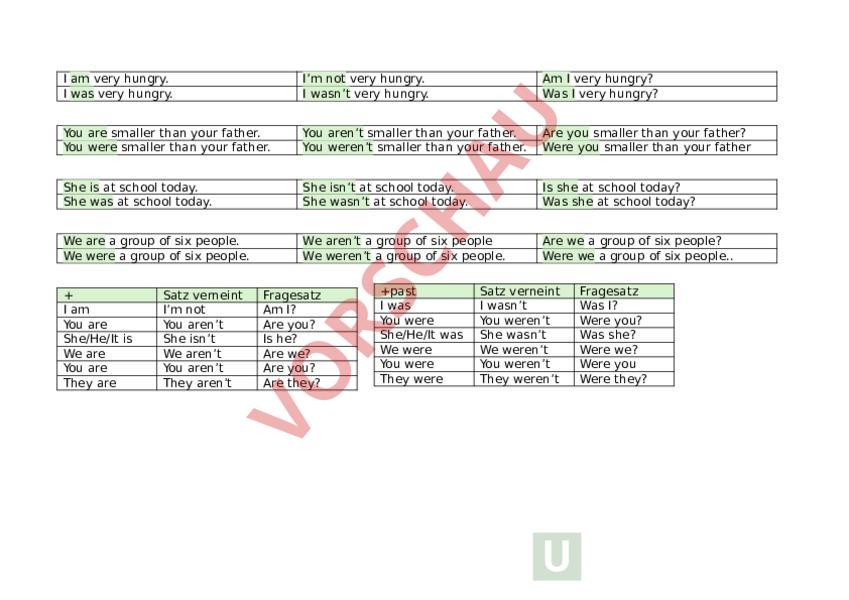Arbeitsblatt: Übersicht to be
Material-Details
Kurzübersicht
Englisch
Grammatik
6. Schuljahr
2 Seiten
Statistik
210979
315
4
03.11.2024
Autor/in
Sarah Jud
Land: Schweiz
Registriert vor 2006
Textauszüge aus dem Inhalt:
I am very hungry. was very hungry. Im not very hungry. wasnt very hungry. Am very hungry? Was very hungry? You are smaller than your father. You were smaller than your father. You arent smaller than your father. You werent smaller than your father. Are you smaller than your father? Were you smaller than your father She is at school today. She was at school today. She isnt at school today. She wasnt at school today. Is she at school today? Was she at school today? We are group of six people. We were group of six people. We arent group of six people We werent group of six people. Are we group of six people? Were we group of six people I am You are She/He/It is We are You are They are Satz verneint Im not You arent She isnt We arent You arent They arent Fragesatz Am I? Are you? Is he? Are we? Are you? Are they? past was You were She/He/It was We were You were They were Satz verneint wasnt You werent She wasnt We werent You werent They werent Fragesatz Was I? Were you? Was she? Were we? Were you Were they? Sätze bilden Grundsätzlich: Positive Sätze können alleine mit dem jeweiligen Verb gebildet werden. Bei Verneinungen und Fragen brauche ich das Verb «to do» do You do She/He/It does We do You do They do dont You dont He doesnt We dont You dont They dont Aussagesätze: Do I? Do you? Does he? Dont we? Dont you? Dont they? did You did She/He/It did We did You did They did verneint didnt You didnt He didnt We didnt You didnt They didnt Vergangenheit Did I? Did you? Did he? Did we? Did you? Didnt they? Nur bei he/she/it in der Gegenwart brauchen wir does oder doesnt Vergangenheit verneint live in Zürich dont live lived didnt live You play very good. You dont play You played You didnt play She sings beautiful. She doesnt sing She sang She didnt sing We carry the luggage We dont carry We carried We didnt carry You help in the kitchen. You dont help You helped You didnt help They wait at the train station. They dont wait. They waited Mit «did» brauchst du wieder die Form der Gegenwart They didnt wait
